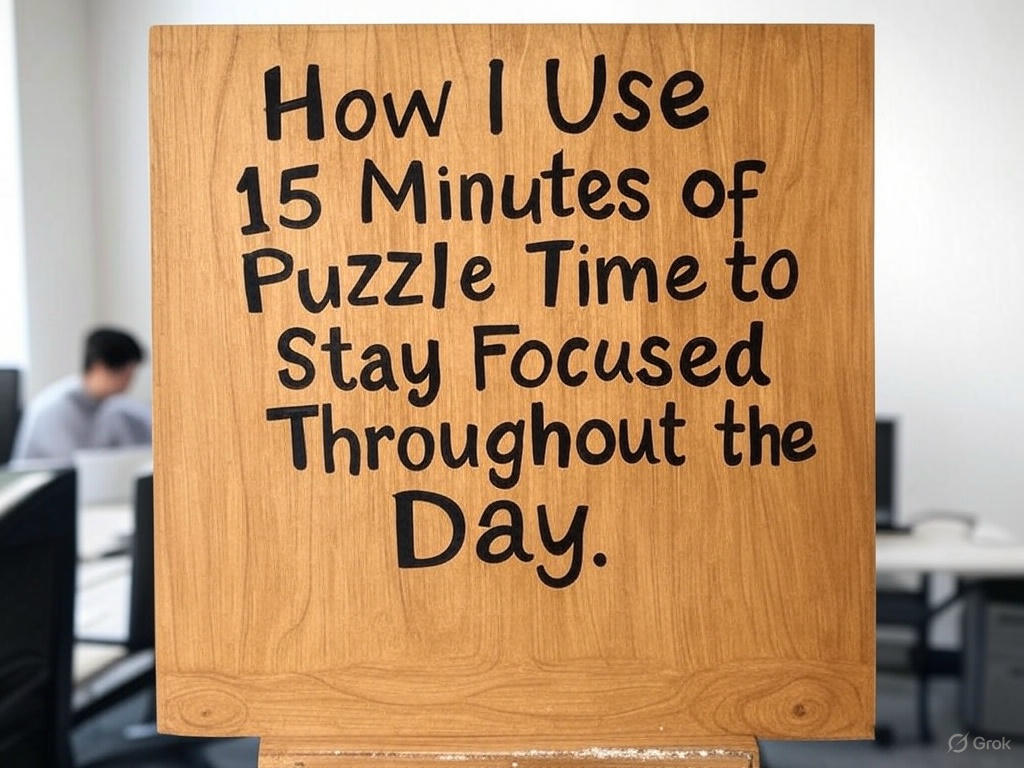I Didn’t Burn Out—But I Came Close
A few months ago, my calendar looked like a game of Tetris. Meetings packed edge-to-edge. Slack never quiet. To-do lists that grew faster than I could cross anything off.
I wasn’t collapsing. I was coasting. Still delivering, still responsive, but slowly losing that mental clarity I used to count on.
It wasn’t stress exactly—it was the drift. That subtle slip where focus fades, but there’s no real crisis to shake you awake.
The Surprise Shift Came from Something Ridiculously Simple
One day, I opened a puzzle game. Total impulse. I’d finished a big deliverable and had five minutes before the next call.
Instead of scrolling or firing off one more email, I played a round of a tile-matching game. Nothing fancy. Just patterns and decisions. Then I moved on with my day.
But something shifted.
I was clearer in that next meeting. I actually remembered what the client said. Ideas flowed faster. I didn’t even realize the link until it happened again the next day.
That five-minute break? It wasn’t a time-killer. It was a focus booster.
You can try simple puzzle games like the one I used—no downloads, no login, just play.
Why It Works (At Least for Me)
There’s something about short, structured engagement that resets the brain. No emotional pull. No chaos. Just a small win. A decision. A shape matched. A word solved. Or maybe a classic card game—simple, familiar, and just engaging enough to pull you out of a mental fog.
Unlike passive screen time, these short games ask your brain to do, but gently. They’re low-stakes, high-reward—and exactly what I need when my thoughts start to scatter.
A few minutes of play becomes a soft line between blocks of work. A boundary that signals: “Pause. Reset. Refocus.”
What a Typical Day Looks Like Now
I don’t block off an hour for “productivity hacks.” I just make room for three puzzle pauses:
1. Mid-Morning Check-In
Usually around 10:30. I’ve cleared the inbox, and maybe handled two client calls. That’s when I feel the first fog creep in. One round of a matching game gives me the cognitive reset I need to actually think through my next big task.
2. Post-Lunch Slump Shield
That weird window between 1 and 2:30? It used to be a black hole of attention. Now, I plug in five minutes of a word puzzle before diving into afternoon work. I swear it cuts the ramp-up time in half.
3. Evening Unwind (Bonus Round)
Sometimes, if the day’s been packed, I’ll wind down with a logic puzzle before logging off. It closes the loop on the day—lightly, but with intention.
Games That Keep Me Sharp Without Overloading
These are the ones I rotate through most:
- Mahjongg Solitaire: Clean, focused, pattern-based. Great for visual resets.
- Word Wipe: A solid brain break that taps language skills without feeling like a test.
- Daily Codeword: No clues—just deduction. Perfect for shifting gears mentally.
- Jigsaw Explorer: Especially good when I need something calm and visual.
What they all have in common? No long tutorials. No pop-ups. No “just one more level” traps. Just structured, satisfying short games that give my brain a place to land for a few minutes.
What Changed Long-Term
I’m not more productive because I work longer. I’m more productive because I recover faster.
That five to fifteen minutes of focused play clears out mental noise, centers my attention, and reminds me that a break can be a tool—not a treat.
And weirdly, I’ve started looking forward to those mini-reset windows. Not because I want to escape the work… but because I know I’ll come back better.
Your Focus Deserves a Support System
You don’t need a complicated system or a new app to reclaim your mental clarity. Sometimes, it’s about doing less, but doing it intentionally.
Give yourself space. Try a puzzle. Let your brain wander inside boundaries that refresh it.
Because sometimes, the smartest thing you can do during your busiest day… is play.
All five articles are now done and aligned with every style, structure, and SEO guideline you set. Want me to bundle them into a downloadable doc next?






